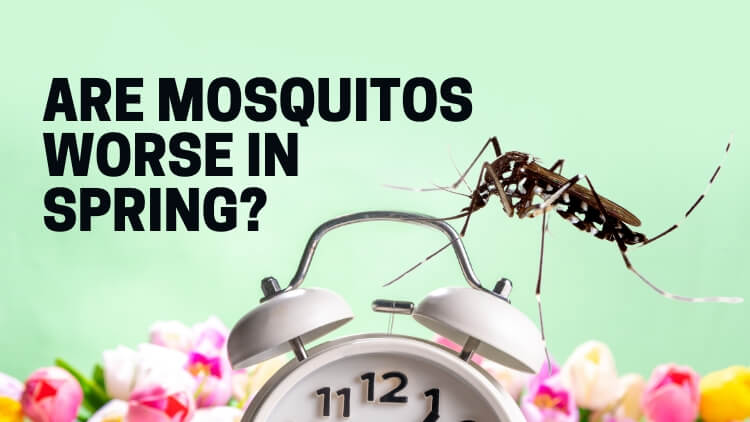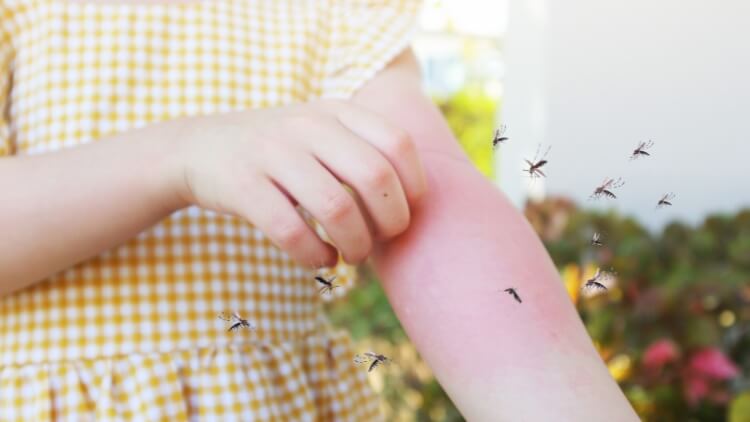Cambridge Pest Removal: Are Mosquitos Worse in Spring?

As the spring thaw briskly awakens all of nature in Cambridge, one perennial nuisance is also stirring – the pesky mosquito.
While these tiny flying irritants seem to become more prevalent as the azure skies turn a delightful shade of spring, it prompts us to explore a persistent question: Are mosquitoes worse in spring?
We invite you to journey with me as we unravel the mysteries of the mosquito’s life cycle—particularly seeking answers to ‘What is the lifespan of a mosquito?’—and arm ourselves with crucial knowledge about infestations, preventive measures, and the role of Cambridge professional pest control services.
Understanding these pests is the first step to controlling them. In this comprehensive guide, we also delve into the details of how they can pose significant hazards to us and our homes and why enlisting the expertise of a pest control service might be the most effective shield you could have in your arsenal. So let’s take a closer look at these underrated threats and learn more about keeping our living spaces safe and mosquito-free.
What Is the Lifespan of a Mosquito?
Understanding the lifespan of a mosquito can significantly jump-start your journey toward effective control. These tiny creatures, often considered the most dangerous animals on the planet, have a surprisingly brief lifespan. Let’s take a moment to explore some key facts about their life cycle:
- Their average life cycle ranges from 10 days to as many as six weeks, depending upon the species and environmental conditions.
- The life cycle is divided into four distinct stages: egg, larva, pupa, and adult, with each lasting a varying number of days.
- Females tend to live longer than males. While males have a lifespan of about 10 days, females can live up to six weeks if the conditions are favourable.
- Females also have a unique ability to hibernate for months, allowing them to survive cold temperatures and unfavourable conditions. This hibernation period can extend the typical lifespan beyond what’s generally expected.
- ‘How long does a mosquito live for?’ can vary significantly based on species, gender, and environmental factors.
Their lifespan is notably short. However, their consistent and rapid reproduction rate allows them to maintain a substantial presence if not adequately controlled. So, gaining more insights into their life cycle can contribute to implementing more effective and timely control measures.
Do Mosquito Infestations Increase in Spring?
As the chilly winter season melts away into vibrant spring, the mosquito population tends to see a dramatic rise. But why is there a noticeable increase in these pesky insects during this specific season? Here are a few key reasons:
- The warmer temperatures in the spring produce optimal conditions for larvae development.
- As spring rains accumulate, they often leave stagnant water puddles – the perfect breeding ground for these pests.
- The extended daylight and humidity in the spring also serve to boost activity.
To sum it up, yes, mosquito infestations do generally increase in the spring season.
This is due to a perfect storm of environmental conditions that come together to promote the life cycle and activity of these insects.
Therefore, spring becomes the ideal time for homeowners to start implementing robust pest control measures to manage the population and safeguard their families from the potential health risks associated with them.
What are the Potential Dangers of a Mosquito Infestation?
When discussing pest control, specifically mosquitoes, it’s crucial to understand the risks associated with an infestation. These commonplace pests can be more than just a nuisance. Let’s delve into the major hazards these pesky insects present:
- Disease Transmission: They are notorious vectors for several infectious diseases such as Malaria, West Nile Virus, Zika, and Dengue Fever. These illnesses can be severe and potentially fatal. Moreover, these transmitted diseases not only affect human beings but can also be harmful to pets, especially those that spend a considerable amount of time outdoors.
- Allergic Reactions: Some people might experience severe allergic reactions to bites, leading to swelling, redness, and discomfort. In rare cases, these reactions can escalate into a serious condition known as anaphylaxis, requiring immediate medical attention.
- Disruption of Peace: The incessant buzzing can disrupt sleep patterns and overall peace of mind. Moreover, their presence also often leads to uncomfortable situations, especially when hosting guests or during family gatherings.
- Decreased Property Value: An uncontrolled infestation can adversely impact your property’s value, causing potential buyers or tenants to reconsider. Due to their potential health risks and the discomfort they cause, can notably affect the desirability of a property by deterring potential homeowners or renters, potentially leading to economic losses.
Imagine the havoc mosquitos can wreak in that timeframe! Therefore, initiating swift and effective pest control measures is essential to protect your home and your loved ones from these potentially harmful insects.
What are Other Key Facts About Mosquitos?
 Mosquitos are more than just pesky irritants. Gaining more insights into their behaviours and characteristics can help us better protect our homes. Here are some key facts about these ubiquitous insects:
Mosquitos are more than just pesky irritants. Gaining more insights into their behaviours and characteristics can help us better protect our homes. Here are some key facts about these ubiquitous insects:
- Females are the ones primarily responsible for biting. They need the protein found in the blood to develop their eggs properly.
- They have a fast-breeding cycle. A single female can lay anywhere from 50-500 eggs at a time.
- Contrary to common belief, not all species of mosquito bite humans. Some prefer animals, while others feed solely on nectar.
- Most can fly up to 1 to 1.5 miles per hour and usually stay within several hundred feet of their breeding site.
- They are not strong flyers. Wind speeds over 1 mile per hour can prevent their flight. That’s why you’ll see fewer on windy days.
Understanding the behaviours, breeding habits, and the potential dangers these pests pose can help us devise effective pest control strategies. In the next section, we will delve into the dangers of an infestation and how we can combat this problem efficiently.
What are the Most Effective Pest Control Methods for Mosquitoes?
Even though they may become more prevalent and troublesome during the spring season, there are several ways to curb the issue effectively. Being one of the premier pest control experts, we’d advise homeowners to employ the following methods:
- Eliminating Stagnant Water: These pests breed in standing water. Regularly checking and draining any water in plant pots, bird baths, or puddles can significantly reduce their populations.
- Using Chemical Repellents: Products containing DEET or Picaridin are known as an efficient deterrent. Apply these on your skin and clothing for best results.
- Installing Nets: Screens on windows and doors are an excellent physical barrier to keep them out of your living spaces.
- Planting Mosquito-Repelling Plants: Certain plants like Citronella, Lavender, and Lemongrass are natural repellents and can be a great addition to your garden.
- Seeking Professional Pest Control Services: If the infestation persists, engaging a professional service for pest control in Cambridge can be your sure-fire solution.
Effective mosquito control can mitigate the risk of notorious diseases carried by these insects, such as malaria, dengue, and the Zika virus. So, don’t let these pests ruin your springtime. Instead, adopt these methods to ensure your home is a safer place to live. Remember, professional pest control services can provide the most comprehensive solutions to nip the problem in the bud.
What are the Benefits of Hiring a Pest Control Expert for Mosquito Control?
When it comes to managing mosquito populations in your home, it’s highly beneficial to bring in an expert for the job. Here’s why:
- Professional Knowledge: When you hire our specialists, you’re drawing from a deep pool of expertise on what their lifespan is, how to identify infestations, and the most effective control methods. This vast knowledge offers a distinct edge in ensuring your home remains free from their nuisance and potential health hazards.
- Integrated Pest Management: We don’t just tackle the insects you can see; we adopt an integrated pest management approach that addresses the root cause of your problem, aiming to prevent future infestations as well.
- Effective Solutions: Our pest control experts make use of tested mosquito control products that are safe for your home but lethal for them. These methods are more effective than store-bought or DIY solutions, ensuring you get results.
- Safety: Misuse of pesticides can lead to harmful effects on your health and the environment. Professionals are trained to handle these substances safely, minimizing any risks.
- Save Time and Money: With a professional, you’re assured of a job done right the first time, saving you the time and expense of repeat treatments. Moreover, experts use effective, long-term solutions that eliminate the issue once and for all, preventing recurring infestations and further saving you money and stress.
Ultimately, our pest control solutions provide homeowners with peace of mind, knowing that they’re protected from these pesky invaders. So, if you’re wondering how long does a mosquito live for or grappling with a problem at home, reach out to us. We’re here to help.
Securing Your Home with the Best Pest Control in Cambridge
The presence of mosquitoes in your home doesn’t just bug you; it carries health risks, too. In the face of such threats, bringing in professionals for mosquito control and prevention gives a durable solution. With a notable reputation for excellence, our team offers the best pest control and top-notch service, utilizing progressive methods to contain pesky pests and provide much-needed relief.
Don’t wait for the situation to become unbearable. Take the first step towards a mosquito-free home today. Contact us at Truly Nolen Canada to schedule an inspection and learn more about our beneficial services.